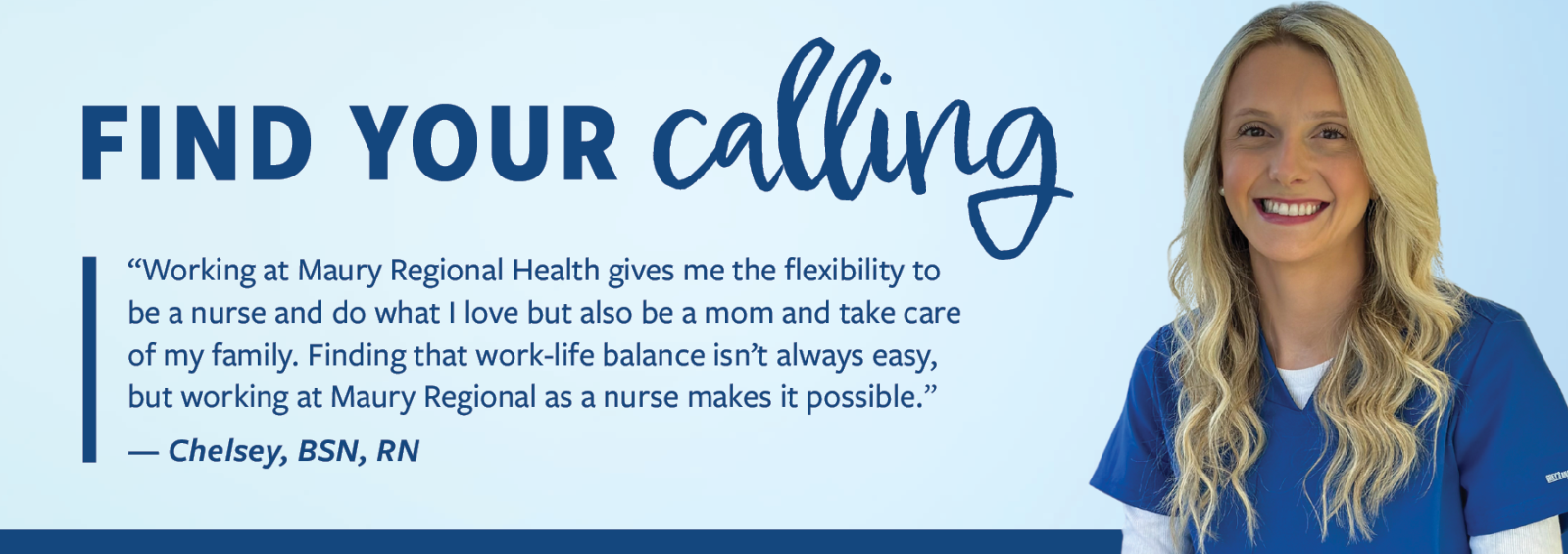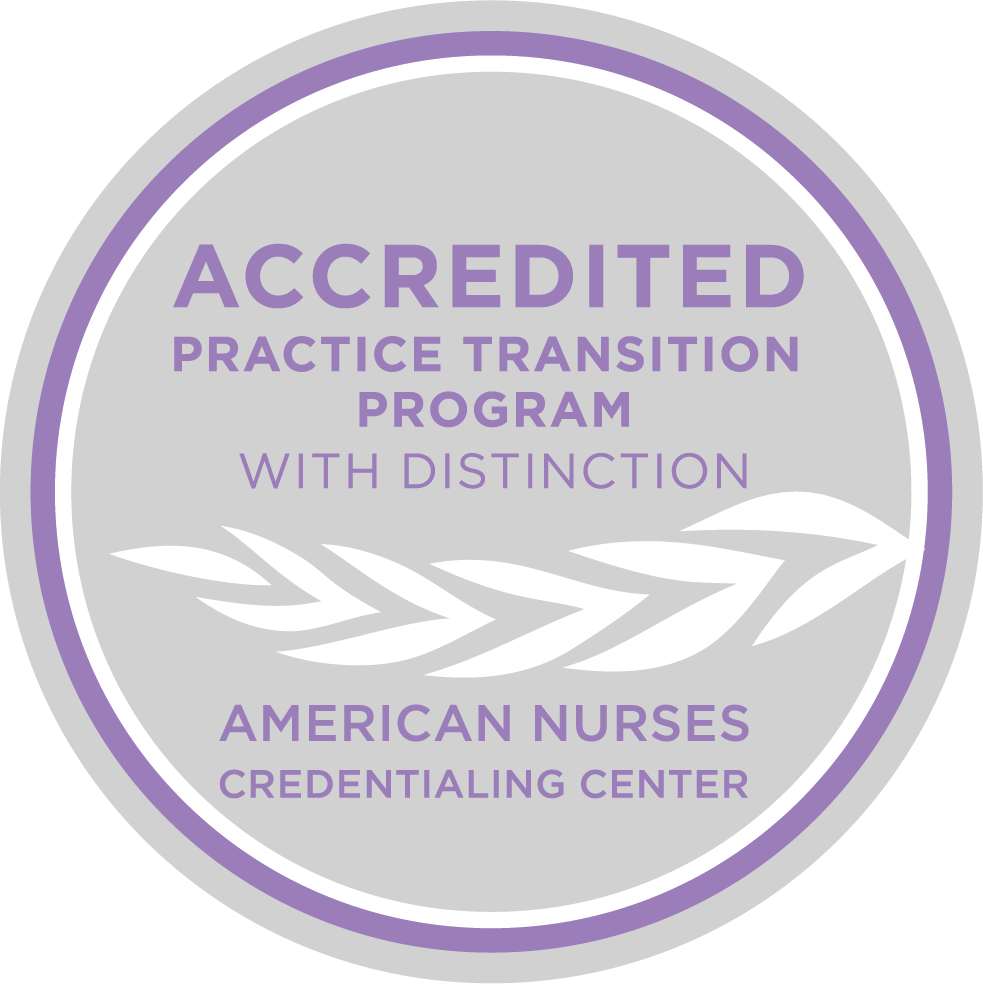
Nursing Education & Professional Development
Maury Regional Health’s Department of Nursing Professional Development is dedicated to providing and promoting education for all members of our nursing team — ranging from student interns and recent nursing graduates to long-time nursing employees.
Our mission is to provide general orientation for all levels of nursing staff, maintain the clinical competency program for the nursing department, provide training for unit secretary development and present all the classes and training for the clinical computer system.
Clinical educators are also assigned to each unit. These educators work with unit-based preceptors to provide specific unit-based orientation, supervise the Clinical Nurse Residency Program for new graduate nurses and maintain the competency program for clinical staff. Based on their clinical expertise, the clinical educators develop and present continuing education courses and develop online learning programs for staff education.
RN Residency Program
Maury Regional Medical Center (MRMC) is dedicated to providing an environment where newly graduated and licensed nurses are supported as they transition into their roles as professional nurses.

Our RN Residency program is accredited with distinction by the American Nurses Credentialing Center's Commission on Accreditation in Practice Transition Programs. MRMC earned this distinction in 2021, becoming the 35th hospital in the world and second hospital in Tennessee to earn this prestigious designation.
Program benefits
- Provides the training and resources needed to make a successful and effective transition to the nursing role in an acute-care setting for the newly licensed RN
- Includes foundational clinical skills, support for the resident during their first year of nursing and opportunities for personal and professional development
- Program content includes:
- Hands-on skills lab
- Simulation
- Critical thinking exercises
- Quality and safety
- Documentation
- Evidence-based practice project
- Professional development
- Ethics
- Mentorship from experienced Maury Regional Health frontline nurses
The curriculum content for the RN Residency Program is based on the Quality and Safety Education for Nurses (QSEN) Conceptual Model for Competencies. The material presented throughout the RN Residency program is focused on patient-centered care, teamwork and collaboration, evidence-based practice, quality improvements, safety and informatics.
Clinical settings include the following departments: emergency, cardiovascular stepdown and short stay unit, ICU stepdown, med/surg, oncology, pediatrics, perinatal, critical care, orthopedics and inpatient surgery.
Eligibility and application process
- Must be hired as a nurse at Maury Regional Medical Center
- Must be a newly graduated and licensed nurse with less than 12 months of professional nursing experience
- Must have an associate or bachelor’s degree in nursing by the designated start date
To apply, visit Careers.MauryRegional.com.
Applications are accepted year-round; however, nursing students are encouraged to apply at the beginning of their last semester before graduation. After applying, qualifying applicants will be invited to participate in a panel interview with nursing leadership.
Program timeline
- A new cohort starts two times per year (winter and summer); however, applications are accepted throughout the year
- Program length is 11 months
Additional information
For more information about Maury Regional Medical Center’s RN Residency Program, please contact:
Jenny Robertson, Human Resources Business Partner
jeroberts@mauryregional.com
931.381.1111, ext. 1095
Rylie Benefield, Recruitment Coordinator
rbenefield@mauryregional.com
931.381.1111, ext. 1050
Nursing Student Opportunities
Maury Regional Medical Center is pleased to provide a number of opportunities for current nursing students seeking to expand their skills in their chosen profession, including interns, externs and student nurse technicians.
Summer or Winter Interns
In this program, student nurses are paired one-on-one with a registered nurse to increase the student’s skill and knowledge of nursing practice. During their time in the program, students will hone their clinical skills, patient-care knowledge, competence and confidence. Working closely with a registered nurse is also an excellent way to strengthen students’ knowledge of how nursing as a discipline is integral to coordinating care and fostering positive patient outcomes.
Admission into the program is competitive and based on the student’s academic performance, references and a panel interview with the organization’s nurse managers. Requirements include:
- Must be currently enrolled in and have successfully completed the first two semesters of an accredited nursing program (associate or bachelor’s)
- Availability to participate full time (36–40 hours per week) and have availability for all shifts, including weekends
- GPA of 2.5 or higher on a 4.0 scale
- Transcript of grades that includes at least two semesters in an accredited nursing program OR a Letter of Status from the Registrar’s Office that stays you are on track to graduate from an accredited nursing program
- American Heart Association or American Red Cross Basic Life Support (BLS) card for health care providers
- Completed application at Careers.MauryRegional.com with an attached resume
To apply, visit Careers.MauryRegional.com. Selected interns must attend hospital and nursing orientations at Maury Regional Health on the assigned dates.
Additional information
For more information about Maury Regional Medical Center’s nursing internship program, please contact:
Rylie Benefield, Recruitment Coordinator
rbenefield@mauryregional.com
931.381.1111, ext. 1050
Student Nurse Technician Program
After nursing students complete the first semester of clinical nursing training, they are eligible to be employed as student nurse technicians.
To be considered for Maury Regional Medical Center’s student nurse technician position, applicants must meet the following requirements:
- Completion of the Fundamentals of Nursing
- Remain enrolled in a nursing program
- Work a minimum of 12 hours per month
- Maury Regional Medical Center recognizes that nursing school can be demanding. To better accommodate nursing students’ schedules, participating employees may work as few as four hours per shift to meet their minimum required hours.
- Be willing to work in any assigned nursing unit
Job responsibilities for the student nurse technician include:
- Monitoring vital signs
- Performing activities of daily living, such as:
- Monitoring intake and output
- Feeding patients
- Changing stage 1 and stage 2 pressure injury dressings
- Removing urinary catheters
- Discontinuing IVs
- Administering cleansing enemas
- Conducting mobility maintenance
Once the student nurse technician completes their nursing program, they can apply for an RN position with Maury Regional Medical Center. If accepted, they will be included in the RN Residency Program that will continue to support their transition into the professional role of an RN.
To apply, visit Careers.MauryRegional.com.
Additional information
For more information about Maury Regional Medical Center’s student nurse technician program, please contact:
Rylie Benefield, Recruitment Coordinator
rbenefield@mauryregional.com
931.381.1111, ext. 1050
Ongoing professional development opportunities
Maury Regional Medical Center offers opportunities for nursing professionals to advance their careers through a range of programs, such as:
- Professional clinical certification program
- Mentorship programs
- Clinical nurse
- Preceptors
- Clinical advancement program
Maury Regional Health is committed to offering a variety of financial assistance programs for nurses who are seeking to complete educational programs that will enhance their professional skills. These programs include tuition reimbursement, the 12 in 24 nursing education program, student loan forgiveness and more.
For more information about financial assistance programs or the application process, visit Careers.MauryRegional.com or contact the Human Resources Department at 931.380.4017.
Professional Clinical Certification Program
Maury Regional Medical Center encourages our nursing team to pursue advanced knowledge in their clinical specialties. To support our team in this endeavor, the organization offers the following support systems:
- Review classes
- Study guides
- Videos
- Study groups
- Access to online and off-site review courses
- Financial assistance for qualifying candidates through the Career Advancement Certification Program
Nurses who earn certifications are recognized through various avenues — including the nursing report, the health system’s employee newsletter (The VitaLink) and recognition in unit halls of fame — and are eligible to be in the Professional Clinic Certification Program, which provides staff an hourly monetary pay increment added to their base salary.
Mentorship
Clinical Nurse Mentorship
Nursing staff who are interested in supporting newly graduated RNs in the organization’s RN Residency Program are eligible to become clinical nurse mentors. As a prerequisite to becoming a clinical nurse mentor, all participants must complete a required three-hour continuing education workshop. They are also required to discuss the roles and obligations of the clinical nurse mentor program with their manager and clinical educator prior to the workshop to determine if they meet the necessary requirements.
Preceptor Program
Maury Regional Medical Center’s preceptor program is designed to facilitate professional growth and experience through the recognition, exploration and study of multiple learning and teaching styles to successfully onboard new nursing staff.
The basic preceptor program is a classroom-based learning experience where participants are taught how to relay information and assess knowledge by ascertaining their own learning style and that of the person receiving the information. The objectives of this program include:
- Identifying the primary roles and responsibilities of the preceptor
- Applying principles of adult learning during orientation
- Applying the use of effective feedback to evaluate performance
- Understanding documentation of performance
- Gaining understanding of personality styles and how they can impact learning
The program consists of a 4-6 hour classroom training, follow-up computer-based training and check-point conversations with managers and/or educators. This program is maintained by the Nursing Professional Development Department's clinical educator staff. Preceptors can choose to be paid a monetary bonus for precepting hours or apply precepting hours to the Clinical Advancement Program.
clinical advancement program
To acknowledge those team members who exceed normal work requirements, Maury Regional Medical Center offers the Clinical Advancement Program. This program provides a monetary reward to those clinical nurses who prescribe to ongoing behaviors of lifelong learning, professional accountability and community stewardship. The clinical nurses who participate in this program must meet minimum eligibility requirements for initial application and continue to meet ongoing mandatory requirements for each annual renewal cycle. The Clinical Advancement Program includes:
- Enhancing clinical skills through a multitude of educational activities, such as:
- Attending internal and external class offerings
- Participating in online learning repositories and journal article reviews
- Engaging in professional development and community stewardship opportunities, such as:
- Attaining advanced nursing degrees
- Serving as a preceptor or mentor
- Participating in councils and committees
- Serving as a community steward
WANT TO JOIN OUR TEAM?
Maury Regional Health is hiring in a number of clinical and non-clinical areas. Find your calling and join a team nationally recognized for excellence. Apply today at Careers.MauryRegional.com.

Maury Regional Health and affiliates are committed to the principles of Equal Employment Opportunity in all aspects of the employer/employee relationship. Maury Regional Health and affiliates grants equal employment opportunities to all qualified persons without regard to race, color, religion, sex (including pregnancy, childbirth, or related medical conditions), national origins (including ancestry), genetic information, disability, age, military/ national guard/ veteran status, sexual orientation, gender identity, or gender expression, or other status protected by state or federal law. Statements made by applicants for employment on this application form will be checked for accuracy. Maury Regional Health campuses are tobacco-free. All tobacco use is prohibited.